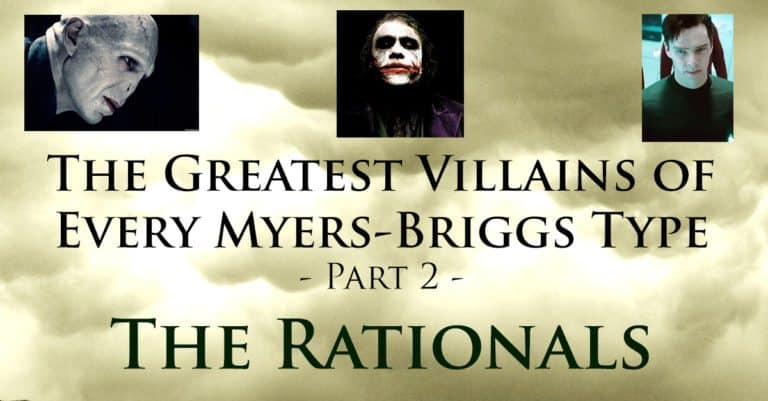The Most to Least Rebellious Myers-Briggs® Personality Types
Some people are born rule-followers. They color inside the lines, read the instructions before assembling furniture, and say things like, “We should probably ask if that’s allowed.” Others? Not so much. Some personalities were practically built to push against authority, question every tradition, and roll their eyes at anything that smells even remotely like arbitrary rules.
But rebellion isn’t just about slamming doors and scowling in a leather jacket. It’s about resisting control, questioning norms, and, sometimes, making the world a better place by refusing to accept the status quo. So which Myers-Briggs types are most likely to throw out the rulebook, and which ones are more likely to make you feel bad for not recycling properly? Let’s dive in.

Not sure what your personality type is? Take our visual personality questionnaire here. Or you can take the official MBTI® here.
Table of contents
- What Does Rebellious Even Mean?
- Where is the Data for this Article From?
- Ranking the 16 Myers and Briggs Types from Most to Least Rebellious
- #1 – The ENTP
- #2 – The ENFP
- #3 – The INTP
- #4 – The ISTP
- #5 – The INFP
- #6 – The INTJ
- #7 – The ESTP
- #8 – The ENTJ
- #9 – The ISFP
- #10 – The ESFP
- #11 – The INFJ
- #12 – The ENFJ
- #13 – The ESTJ
- #14 – The ISFJ
- #15 – The ISTJ
- #16 – The ESFJ
- Sources:
- What Are Your Thoughts?
Estimated reading time: 15 minutes
What Does Rebellious Even Mean?
According to the Cambridge Dictionary, “If someone is rebellious, they are difficult to control and do not behave in the way that is expected.”
Dictionary.com states that rebellion means, “resistance or defiance of any authority, control, or tradition.”
Where is the Data for this Article From?
These rankings are based on my own research and experiences as an MBTI® practitioner, as well as research based on case studies conducted in 1997 from “The Relationship Between MBTI® and Measures of Personality and Performance in Management Groups,” by J.W. Fleenor. The MBTI® Manual also has data related to the 16 Myers-Briggs personality types and their results on the CPI™ tool. This tool, The California Psychological Inventory Assessment, measures individuals on many different categories like Sociability, Self-acceptance, Independence, Self-control, Communality, and more. One of the things it measures is rebelliousness, dislike of conforming, and the propensity to have unconventional views. That is one of the sources where the data for this article is taken from. You can find out more by scrolling down to the sources section of this article.
Disclaimer: While this article may show trends (certain types tend to be more rebellious than others) it is by no means a prescription. Some types may experience particular situations that make them more or less rebellious, regardless of what type they are.
Ranking the 16 Myers and Briggs Types from Most to Least Rebellious
#1 – The ENTP
ENTPs are the human embodiment of a debate club that never disbands. If there’s a rule, they want to know why it exists. If there’s a tradition, they want to see if it holds up under scrutiny. And if someone says, “Because that’s the way it’s always been done,” ENTPs will take that as a personal challenge.
These types don’t just question authority—they actively enjoy poking it, like a scientist pressing buttons to see what happens. They’ll argue just for the fun of it, even if they agree with you. (Seriously, if you’ve ever found yourself debating whether socks should go on before or after pants at 2 AM, you might have an ENTP in your life.) Their rebellion isn’t always fueled by angst (that’s more Feeling-Perceiver territory)—it’s fueled by curiosity, creativity, and a deep-seated need to explore every possible angle of reality.
They’re not reckless rule-breakers, though. ENTPs don’t just rebel for the sake of being contrary—they want to improve things. If a rule is stupid, they’ll prove why it’s stupid. If an authority figure is incompetent, they’ll challenge them to a battle of wits (Vizzini in The Princess Bride? Likely an ENTP). The only thing ENTPs respect more than a good argument is someone who can out-debate them.
#2 – The ENFP
ENFPs are like ENTPs, but with more emotions and a slightly higher chance of running away to join a revolution in the name of the cause.
These free spirits can smell inauthenticity from a mile away, and they will call it out. They don’t rebel just for fun—they do it because something doesn’t feel right. If they see injustice, hypocrisy, or outdated traditions that hurt people, they won’t just question them—they’ll set them on fire (metaphorically…usually).
But here’s the thing: ENFPs don’t always look rebellious. They can be warm, bubbly, and charming, the kind of people who make friends in the grocery store line. But beneath that friendly exterior is a deeply independent thinker who refuses to be boxed in. Society says you have to pick one career path? Nope. Tradition says you have to do things a certain way? Try again. ENFPs are allergic to anything that limits their freedom, creativity, or ability to be their authentic selves.
Their rebellion is less about arguing and more about defending. They’ll start movements, change minds with passionate speeches, and leave you rethinking your entire life philosophy over coffee. If ENTPs are the ones challenging the rules, ENFPs are the ones leading the charge toward a new way of doing things.
#3 – The INTP
According to a 1994 case study on personality and expressed values, NTPs scored higher than any other types on self-oriented individualism. INTPs are the quiet, skeptical rebels who sit in the back of the class, arms crossed, mentally dissecting every word the teacher says. If an idea doesn’t hold up to logical scrutiny, INTPs are not going to accept it—no matter how many people do.
These types are independent thinkers to the extreme. They don’t care about fitting in, following trends, or accepting things at face value. If they’re going to believe something, they need to prove it for themselves. And if they find a flaw in the system (which they will), they’ll make it their personal mission to break it down and build something better.
But here’s the thing: INTPs don’t always look rebellious. They’re not out there yelling at authority figures or starting protests (usually). Instead, they quietly opt out. They’ll ignore rules that don’t make sense, bypass traditions they find illogical, and side-eye anyone who follows authority blindly. They may not argue with you—they’ll just dismantle your entire worldview in a single, devastatingly well-thought-out sentence.
#4 – The ISTP
According to a study on type and the CPI™ inventory (MBTI® Manual, pg. 354) ISTPs were often skeptical about others’ intentions. They also ranked as insisting on being themselves even if it caused friction. These types are the action-oriented rebels who don’t have time for bureaucracy, red tape, or rules that slow them down. Where other types might debate or philosophize about a problem, ISTPs are already three steps ahead, fixing it in a way that probably violates at least five regulations.
They’re not here to challenge authority for the fun of it—they just genuinely don’t care about it. If something needs to be done, they’ll do it, and if a rule gets in the way, well…that’s not their problem. They have a strong sense of personal independence and hate being micromanaged. The fastest way to make an ISTP rebel is to try to control them.
And don’t mistake their quiet nature for compliance. ISTPs aren’t loud about their rebellion, but they will find a way around any obstacle. They’re practical problem-solvers who will tweak, hack, and modify things to work the way they want them to. And if you tell them they can’t do something? They’ll just do it anyway—without asking for permission.
#5 – The INFP
INFPs are the soft-spoken rebels you don’t see coming. They’re not out there throwing molotov cocktails at oppressive systems—at least, not literally. But make no mistake: beneath their gentle, quiet exterior is an unshakable core of defiance.
These types are driven by their inner values, and if a rule contradicts what they believe is right, they will not follow it. Period. If society says “this is just the way things are,” INFPs will ask, But what if it wasn’t? They don’t rebel for the sake of rebelling—they do it because something feels wrong on a deep, existential level.
But here’s the thing: their rebellion isn’t always loud. Sometimes it looks like quietly refusing to conform, living life on their own terms, and walking away from anything that feels inauthentic. Other times, it looks like passionately advocating for a cause, pouring their entire soul into fighting injustice, and writing poetic manifestos that make you rethink everything you thought you knew.
If ENFPs are the charismatic revolutionaries giving speeches on a podium, INFPs are the ones in the background, writing the words that inspire them. They’re the ones reminding us that rebellion isn’t just about tearing things down—it’s about creating something better.
Read This Next: Understanding INFP Rage
#6 – The INTJ
According to the MBTI® Manual, INTJs were simultaneously responsible and serious about their duties and obligations while insisting on being themselves even if it caused friction (MBTI® Manual, pg. 354). These types don’t rebel in an obvious, rule-breaking, “Look at me, I’m a nonconformist” way. No, their rebellion is cold, calculated, and terrifyingly efficient.
These types don’t care about tradition. They don’t care about hierarchy. And they definitely don’t care about rules that exist just because “that’s the way it’s always been.” If a system is inefficient, they will burn it to the ground—not out of spite, but because they know they can build something better.
What makes INTJs dangerous (and kind of impressive) is that they don’t just question authority—they replace it. They aren’t satisfied with mindless rebellion; they want control. They’re like, “Oh, the system is broken? Cool. I’ll build a new one, and it will be 10 times more efficient and I’ll run it.”
And if you try to boss them around? Good luck. INTJs respect intelligence, logic, and strategic thinking—not rank. If they think you’re incompetent, they will quietly dismantle your authority without you even realizing it’s happening. One moment you’re their boss, the next moment they’re running the entire operation while you wonder how you got demoted.
Read This Next: 24 Signs That You’re an INTJ, the Strategist Personality Type
#7 – The ESTP
ESTPs are the wild cards of rebellion. They’re the ones who don’t just bend the rules—they break them, reshape them into something more interesting, and then laugh about it over a drink.
Unlike some of the more brooding rebels on this list, ESTPs don’t typically rebel because of deep existential convictions. They rebel because rules are annoying and who has time for all that bureaucracy? If something is slowing them down, they’ll find a way around it. If a law doesn’t make sense, they’ll ignore it. If someone says, “You can’t do that,” their immediate response is, “Watch me.”
These types are natural risk-takers, and they don’t just defy authority—they actively enjoy the thrill of pushing boundaries. They’re the ones sneaking into VIP sections, sweet-talking their way past security, and pulling off things that technically shouldn’t be possible. Rules exist to be tested, and ESTPs are more than happy to be the test subjects.
The only authority they truly respect? Their own instincts. Everything else is negotiable.
#8 – The ENTJ
ENTJs don’t have time for petty defiance or pointless rule-breaking. If they’re going against authority, it’s because they plan to become the new authority.
These types are born leaders, and they hate being controlled. If they have to follow rules, they’ll do it—for now. But give them a little time, and suddenly they’re the ones in charge, making the rules, and running the whole show. They don’t rebel like ESTPs, who actually enjoy a little chaos and unpredictability. ENTJs rebel with strategy. If the system is flawed, they’ll rise through the ranks, take over, and fix it from the top.
That’s the key difference between an ENTJ and a more impulsive rebel—ENTJs don’t just reject authority. They replace it. If they’re defying orders, it’s not because they can’t follow them—it’s because they think they could do a better job.
#9 – The ISFP
ISFPs are quiet rebels. But don’t mistake their calm demeanor for compliance—because when it comes to their values, they are utterly, completely, unshakably defiant.
These types live by one rule: Be true to yourself. If society says, “This is the way things should be,” an ISFP’s gut response is, “Yeah, but why, though?” If a rule doesn’t align with their personal beliefs, they will ignore it. If a tradition feels oppressive, they’ll opt out. And if someone tries to tell them how to live their life? Good luck with that.
But unlike more outspoken rebels, ISFPs don’t feel the need to justify their choices. They won’t launch into a philosophical debate about nonconformity; they’ll just do their own thing and let everyone else figure it out. They’re the ones quietly dressing, living, and thinking however they want—regardless of what anyone else says.
#10 – The ESFP
ESFPs don’t plan to be rebellious—it just kind of…happens.
Rules? Too restrictive. Traditions? Too boring. Authority figures? They’d better be fun or ESFPs are not interested. These types live for freedom—freedom to express themselves, freedom to experience life, and freedom to do whatever feels right in the moment. If someone tries to put limits on them, their immediate instinct is to push back—sometimes just for the thrill of it.
But here’s what makes ESFPs different from other rebels: they’re charming. They don’t just break rules and hope for the best—they make people want to bend the rules for them. They’re the ones talking their way backstage, getting out of speeding tickets with a smile, and convincing you that yes, it is absolutely a great idea to sneak into that fancy event.
#11 – The INFJ
INFJs are secret rebels. On the surface, they’re polite, considerate, and often seen as deep, introspective thinkers. But if you assume that means they follow the rules? Oh, sweet summer child.
INFJs don’t care about rules. They care about truth. They don’t break traditions just to be different—but if a tradition is outdated or harmful? They’re not just questioning it—they’re planning its demise.
What makes INFJs interesting is that their rebellion is often hidden. They don’t make a big show of defying authority, but they will quietly maneuver around it. They’ll bend the rules where necessary, ignore them when convenient, and, if given enough time, completely restructure an entire system to align with their vision.
INFJs are idealists, and their rebellion comes from a deep, burning desire to make the world better. Unlike some types who push back against authority impulsively, INFJs are careful and diplomatic about it. They’re the ones planting seeds of change, influencing people behind the scenes, and working toward a bigger goal.
Read This Next: 24 Signs You’re an INFJ, the Mystic Personality Type
#12 – The ENFJ
ENFJs are rebels with a cause. They don’t push against authority just because they can—they do it because they must.
These types aren’t about pointless defiance. If a rule is just, they’ll follow it. If an authority figure is competent, they’ll respect them. But the moment they sense corruption, injustice, or unnecessary restrictions, they will not stay silent.
What makes ENFJs stand out is their ability to bring people along with them. They don’t just rebel alone—they start movements. They can inspire, persuade, and rally a crowd like it’s their natural-born calling. If you ever see a passionate speech going viral, there’s a good chance an ENFJ is behind it.
But here’s where it gets tricky: ENFJs actually like structure…as long as it’s a good structure. They believe in leadership, but only if that leadership is worthy. They want harmony, but not at the expense of integrity. So while they’re not the most overtly rebellious type, they will challenge authority when it’s necessary—just in a way that gets people on their side first.
#13 – The ESTJ
ESTJs aren’t exactly rebellious most of the time. In fact, according to the MBTI® Manual, these types rank higher than most other types on being conventional, fitting in, and working well within a structured, conservative setting (MBTI® Manual, pgs. 354 & 355).
To put it plainly, ESTJs are probably the least likely type to get a face tattoo just to prove a point.
These types thrive on structure, order, and knowing the rules—not because they blindly follow them, but because rules keep things running smoothly.
That said, ESTJs are not mindless drones. They’re practical, direct, and will absolutely challenge bad authority. If a rule is inefficient? They’ll break it. If a leader is incompetent? They’ll call them out. If a system isn’t working? They will fix it.
ESTJs aren’t chaotic rule-breakers; they’re the people rewriting the rules to make them actually work. If an ESTJ respects you, they’ll follow you. If they don’t? Good luck, because they’ll either bulldoze over you or replace you with someone better.
#14 – The ISFJ
ISFJs are the quietest rule-followers on this list. They believe in tradition, they respect structure, and they like knowing what’s expected of them. But just because they aren’t out there storming the castle doesn’t mean they don’t have a rebellious streak. It’s just…very specific.
You see, ISFJs don’t break all the rules—they break the right ones. They might not question authority in general, but the moment an authority figure contradicts their core values? Game over. ISFJs will follow the rules until the rules ask them to betray what they believe in. That’s when the gloves come off.
They may not be loud about it, but ISFJs will quietly resist, undermine, and outlast any authority they disagree with. Their rebellion looks like silent defiance, friendly noncompliance, and—when pushed too far—beautifully crafted takedowns that no one saw coming.
#15 – The ISTJ
According to the MBTI® Manual, ISTJs ranked highly on conforming to rules, seldom getting in trouble, suppressing hostile feelings, and appreciating convention and well-organized, predictable situations.
So yeah, you could say they kind of appreciate the rules and a stable sense of authority.
That said, many ISTJs I’ve known in person have considered themselves rebels of a sort. While they may obey most rules, they are particular about their personal freedoms and their personal space.
I know quite a few ISTJs, for example, who rebel against rules that infringe upon their personal beliefs, religious or otherwise. That’s where ISTJs quietly, methodically, and ruthlessly rebel. They won’t make a scene about it, but they will find a way to do things their way. They’re not reckless rebels—but they are principled rebels.
#16 – The ESFJ
ESFJs are the least rebellious type on this list—not because they’re mindless conformists, but because they actually care about community, harmony, and maintaining social balance. They like when things are structured, predictable, and pleasant. If following the rules helps keep people happy and connected, they’ll happily follow them.
That said…ESFJs do have their limits. While they won’t break rules just because, they will push back if those rules hurt the people they care about. I know many ESFJs who are pretty outspoken about their beliefs, even if they contradict someone else they care about. But those beliefs are usually tied to their values, their religion, or their politics in a way that they feel directly benefits (or harms) others.
If they see injustice, cruelty, or anything that disrupts their carefully maintained world of functional social order, they’ll step in.
They might be rule-followers, but their loyalty to people will always come first.
Sources:
The MBTI® Manual: A Guide to the Development and Use of the Myers-Briggs Type Indicator®Instrument. Third Edition
Type and Authority TYPEtype, the New Zealand Application of Psychological Type
Journal of Psychological Type Volume 40, 1997
What Are Your Thoughts?
Do you agree with my rankings? Disagree? Share your thoughts with other readers in the comments!
Find out more about your personality type in our eBooks, Discovering You: Unlocking the Power of Personality Type, The INFJ – Understanding the Mystic, The INTJ – Understanding the Strategist, and The INFP – Understanding the Dreamer. You can also connect with me via Facebook, Instagram, or Twitter!














I did a very similar thing for comparing Conservative to Liberal using a point system for each MBTI trait. The results are rather similar if you reverse from Liberal to Conservative. You will find that the INTPs are the strongest Libertarians (in the middle of Conservative vs Liberal), and the Extroverted form of that being the most Rebellious ENTP.
ESTJ Supervisor 5
ISTJ Inspector (4.5 – 0.5) = 4
ENTJ Fieldmarshall (4 – 1) = 3
ESTP Promoter (3.5 – 1.5) = 2
INTJ Mastermind (3.5 – 1.5) = 2
ESFJ Protector (3 – 2) = 1
ISTP Crafter (3 – 2) = 1
ISFJ Provider (2.5 – 2.5) = 0
ENTP Inventor (2.5 – 2.5) = 0
ENFJ Champion (2 – 3) = -1
INTP Architect (2 – 3) = -1
ESFP Entertainer (1.5 – 3.5) = -2
INFJ Counselor (1.5 – 3.5) = -2
ISFP Composer (1 – 4) = -3
ENFP Teacher (0.5 – 4.5) = -4
INFP Healer -5
Susan, I just wanted to mention that I believe ENTPs do mellow out a bit as they get older. I still like to debate, but I’m far more choosy about it and I don’t have to win as long as I learn something from the exchange. I’m a lot better at not unintentionally hurting others’ feelings by being too honest/blunt also, my tertiary Fe has taught me some discretion.
ESTPs are the most rebellious. They have Se and don’t value Si which is your own subjective impressions.
They are actually the ones most likely to act on an impulsive and rebellious scheme due to their dominant se.
Entps have inferior Si meaning they actually desire to reconcile with their past impressions but have a hard time to. They also hardly value se which is the function that helps one most in applying physical force to the environment.
The function stacks were never proven to be valid. So you have to evaluate the types based on how they behave in real life, not how they are *supposed* to behave theoretically. To simplify things, ESTPs are like jocks, and ENTPs are like punk rockers or class clowns. Who is more rebellious? Well, the ESTP is the more physically imposing (like bullies), rebellious in some ways, but not in other ways. For example, ESTPs will follow the rules when it comes to the sports they play. They will most likely eventually settle down to marriage, even if they conform to the hookup culture in their 20s. ENTPs are more likely to say sports are stupid and why marry when you can just live together for free? Therefore, ENTPs are more rebellious.
This is interesting. Some people that I know took this MBTI test out of force some of them took it based on a couples counselor‘s recommendation. To no surprise, my father is.ENTP. Husband is.INTP
I am INFP
A professional person with whom I associate INTJ. A close female friend is also this personality type.
Like I said, surrounded by the right type of people. Love getting into debates with my dad we both question everything. So does my husband. When my father and husband met those two could go on about electricity and debates for hours.
INTJ person to no surprise destroyed two toxic Neurology Departments. Now he works for himself. I remembercontinuously bugging him about it. Do you think you’ll ever stop working for incompetent fools? The only thing he wanted me to do is to not say that so loud. but my God after medical discussions, we can go on about that for too long lol
My female friend left certain schools she got a head of a laboratory person suspended.
Nothing better than leaving someone dismantled on top of that simply the silent F you
I also came to the conclusion that ENTP was the most rebellious. I agree with your rankings for the most part, but I think that the least rebellious is ISFJ, ENTP’s opposite. The I means they’re cowardly/shy, the S means they’re traditional, the F means they’re people pleasing, and the J means they’re dutiful.
As an INTP I may or may not follow a given rule, depending on the reason for it and what’s at stake. I would let my dog run loose on the backcountry trails of a local park because I knew she was socialized to other dogs and wouldn’t bite anyone, which is why we have leash laws. On the other hand if someone’s actions affect society as a whole then I expect them to follow the rules (or societal expectations) and be considerate. Put your trash in the trash can. Pick up your dog’s poop. Don’t go out in public if you’re sick. Recycle. Don’t double-park. The spirit of the law – the reason it was written in the first place – is more important than the letter.
I should add that I rarely saw anyone else on the backcountry trails, although the one leash-nazi I ran into had a dog that behaved more badly on a leash than mine did off-leash. But after she lost track of me once and ran all the way back to the car looking for me, I started keeping her on a leash.